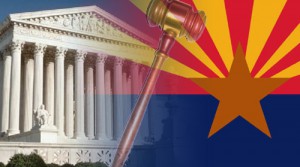Arizona’s Other Controversial Law: Punishing Employers Who Hire Illegal Immigrants
For a while now Arizona has been a most popular state in the headlines. From the victims of the recent shooting tragedy to the controversial SB 1070 law still in discussion, it seems that Arizona is the stage for a drama of epic proportions. Like a pivot point, nearly all of the Arizonian issues have been revolving around the issue of immigration.
To keep you updated, as many as seven major immigration law cases have already been filed, and there is talk of revising birthright citizenship rights for children of illegal immigrants. Many states including Florida and Kentucky have followed Arizona’s lead and are contemplating making their immigration policies stricter. The issue has even spawned a sharp-edged Hollywood movie that blatantly references the political debate. Whew, it’s been busy in the Southwest…
 And as the immigration madness continues, it might have been easy to overlook a little-known but nonetheless monumental employment law that has been under review by the U.S. Supreme Court. Officially entitled “The Legal Arizona Workers Act” (LAWA), this law makes it a requirement for all employers in the state of Arizona to use the E-Verify system to confirm that all newly hired employees are in the country legally.
And as the immigration madness continues, it might have been easy to overlook a little-known but nonetheless monumental employment law that has been under review by the U.S. Supreme Court. Officially entitled “The Legal Arizona Workers Act” (LAWA), this law makes it a requirement for all employers in the state of Arizona to use the E-Verify system to confirm that all newly hired employees are in the country legally.
The Workers Act went into effect in 2008 and imposes sanctions on employers who have hired illegal immigrant workers. As a means of punishment, employers in violation would not be subject to fines, but instead would have their business license completely revoked. Arizona’s unique law on employer sanctions has added more fuel to the fiery debate on all sides.
Critics believe that the law is unconstitutional because it allows a state to punish business owners in connection with immigration issues, an area which they claim is the exclusive providence of the federal government. Also, opponents argue that the E-Verify system is only voluntary under federal requirements. Thus, Arizona may have stepped beyond its bounds by making it mandatory.
On the other hand, proponents of the law claim that state enforcement of employers has become necessary since the federal government has done little to enforce its enforcement policies. Many feel that Arizona is running out of options when it comes to addressing the immigration situation. Advocates also contend that the Act has in fact been effective in discouraging employers from hiring illegal immigrants.
The Legal Arizona Workers Act came under direct scrutiny last December 2010 in the Supreme Court case of Chamber of Commerce vs. Whiting. Here, the main focus of the debate was whether the state of Arizona can constitutionally sanction employers who willing hired undocumented workers. In particular, the definition and role of “business license” was heavily debated.
I think that the Whiting case and the Workers Act illustrate an important point to remember when considering Arizona’s immigration situation. The point is this: nothing happens in a vacuum. The overall issue does not just involve an overwhelming immigration crisis, but is deeply connected with the area of employment law. The immigration challenge is not just about traffic across borders, but it also involves what happens once the immigrant is here, whether legally or not.
Personally I tend to favor the Legal Arizona Worker’s Act. I believe that as community leaders, employers have a great responsibility to set an example of ethical conduct. This includes hiring workers in a manner that conforms with the law. From a business law standpoint, there is no reason why a business owner should not be subject to sanctions if they have broken the law or assisted a person in doing so. Professional standards should not be overlooked simply because a sensitive matter such as immigration is involved.
On the other hand, I concede that the E-Verify system may itself be flawed. Even if the employer is using the E-Verify system, it can easily be circumvented with a fake ID. And again, very few business owners have actually been sanctioned under the Worker’s Act. Instead, the law has actually impacted the workers more than the employers- many illegal immigrant workers have been arrested during employer sanctions investigations.
But a good thing is that the recent Supreme Court hearing does provide another piece to the overall puzzle which is Arizona. Something as seemingly unrelated as a business license is actually a key factor here, since Arizona’s economy is also at the heart of the matter. We’re not just talking about blindly creating strict regulations based on abstract principles or numerical figures. Rather, this is an attempt at balancing several different interests all at once, which of course is very difficult. And as the pieces come out, hopefully we can get a better picture of the complex conditions we are dealing with.


Comments